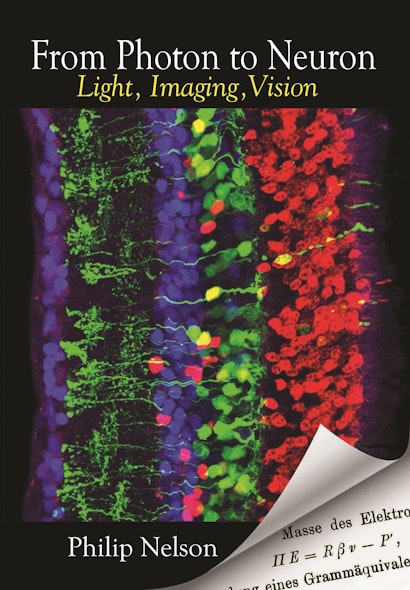Students in the physical and life sciences, and in engineering, need to know about the physics and biology of light. Recently, it has become increasingly clear that an understanding of the quantum nature of light is essential, both for the latest imaging technologies and to advance our knowledge of fundamental life processes, such as photosynthesis and human vision. From Photon to Neuron provides undergraduates with an accessible introduction to the physics of light and offers a unified view of a broad range of optical and biological phenomena. Along the way, this richly illustrated textbook builds the necessary background in neuroscience, photochemistry, and other disciplines, with applications to optogenetics, superresolution microscopy, the single-photon response of individual photoreceptor cells, and more.
With its integrated approach, From Photon to Neuron can be used as the basis for interdisciplinary courses in physics, biophysics, sensory neuroscience, biophotonics, bioengineering, or nanotechnology. The goal is always for students to gain the fluency needed to derive every result for themselves, so the book includes a wealth of exercises, including many that guide students to create computer-based solutions. Supplementary online materials include real experimental data to use with the exercises.
- Assumes familiarity with first-year undergraduate physics and the corresponding math
- Overlaps the goals of the MCAT, which now includes data-based and statistical reasoning
- Advanced chapters and sections also make the book suitable for graduate courses
- An Instructor’s Guide and illustration package is available to professors
Philip Nelson is professor of physics at the University of Pennsylvania. He is the author of Biological Physics and Physical Models of Living Systems, and coauthor of A Student's Guide to Python for Physical Modeling (Princeton). Among other honors, he has received the Biophysical Society's Emily M. Gray Award for educational excellence.
"From Photon to Neuron: Light, Imaging, Vision completes a trilogy begun by Biological Physics and Physical Models of Living Systems. Those works establish Nelson as the preeminent author of textbooks at the intersection of physics and biology. . . . Nelson uses words, pictures, formulas, and code to teach students how to construct models and interpret data. His books provide a master class in how to integrate those four different approaches into a complete learning experience."鈥擝radley Roth, Physics Today
"A thorough and sweeping tour from the fundamental physics of light to the neurobiology of the retina, with many asides into modern advances in imaging. Lavishly illustrated and carefully explained. . . . The book itself is a gem."鈥擲枚nke Johnsen, American Journal of Physics
"As elegant as it is deep. A masterful tour of the science of light and vision, it goes beyond artificial boundaries between disciplines and presents all aspects of light as it appears in physics, chemistry, biology and the neural sciences. . . . In the same way that the author instructs non-physics students in some basic physics concepts and tools, he also provides physicists with accessible and very clear presentations of many biological phenomena involving light. . . . One of the most insightful, cross-disciplinary texts I have read in many years. It is mesmerising and will become a landmark in rigorous, but highly accessible interdisciplinary literature."鈥擫uis Alvarez-Gaum茅, CERN Courier
"Intriguing, useful, and interdisciplinary. Nelson's excellent book provides students with a comprehensive introduction to the interaction between light and biosystems."鈥擹hong-Can Ou-Yang, Institute of Theoretical Physics, Chinese Academy of Sciences
"The science of light and vision transcends the artificial boundaries between physics, chemistry, and biology. Isaac Newton appreciated this. Phil Nelson does, too. Nelson masterfully blends the natural sciences to explore how we perceive and control light."鈥擜dam Cohen, Harvard University
"This unusual book covers a huge variety of topics on light and vision, from fundamental physics to human visual psychophysics to some of the latest optical-microscopy techniques. Students and researchers alike in the physical and life sciences will find the book fascinating."鈥擪ing-Wai Yau, Johns Hopkins University School of Medicine
"Nelson has taken a subject usually treated in depth only at the graduate level and developed an understandable and coherent treatment appropriate for undergraduates. He provides a unified framework with which to discuss the disparate ways biological systems interact with light and the variety of ways researchers use light as a biological probe. There is no serious competitor for this book."鈥擜lex J. Levine, University of California, Los Angeles
"Engaging and unique. This is an excellent and well-developed textbook on the physics of light as it is processed by biological organisms and on how light can be used to interrogate biological material. From Photon to Neuron is poised to become a standard text for both physicists and biologists."鈥擲tephanie Palmer, University of Chicago
More online resources for students and instructors are maintained by the author at

